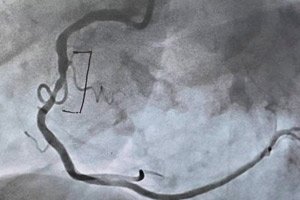
All iLive content is medically reviewed or fact checked to ensure as much factual accuracy as possible.
We have strict sourcing guidelines and only link to reputable media sites, academic research institutions and, whenever possible, medically peer reviewed studies. Note that the numbers in parentheses ([1], [2], etc.) are clickable links to these studies.
If you feel that any of our content is inaccurate, out-of-date, or otherwise questionable, please select it and press Ctrl + Enter.
Coronary artery calcium indices predict risk of heart attack and death
Last reviewed: 02.07.2025
 ">
">The study confirms the accuracy of using the coronary artery calcium index to predict the risk of heart attack and mortality.
The coronary artery calcium (CAC) score has become a noninvasive way to assess the level of plaque buildup in the coronary arteries, but questions remain about its accuracy in identifying women, as well as men, at high risk of heart attack or death.
A major new study conducted by researchers at Intermountain Health in Salt Lake City found that the CAC score not only effectively predicts the risk of future heart attacks, but also predicts the likelihood of dying from any cause. What’s more, the accuracy of the prediction was equally high for both women and men.
Key findings of the study:
- Risk of death and heart attacks: People with a CAC score of zero were three times less likely to die from any cause.
- Predictive Accuracy: CAC has been shown to be an accurate predictor of overall health and prognosis, beyond just cardiovascular disease.
"The coronary artery calcium index is an excellent and accurate indicator of health and overall prognosis, even beyond cardiovascular disease," said Jeffrey L. Anderson, the study's principal investigator and an emeritus physician scientist at Intermountain Health.
Research methodology
The study results were presented at the American Heart Association National Scientific Sessions in Chicago on November 18, 2024.
- The study analyzed the medical records of 19,495 women and 20,523 men who had undergone PET/CT scanning for suspected heart disease but who had not yet had a cardiac event such as a heart attack.
- Of this group, 7,967 people had a CAC score of zero, indicating no calcified plaque in their coronary arteries.
- Women with a CAC score of 0 were, on average, older than men (60.5 years versus 53.8 years), confirming that heart disease often develops later in women than in men.
Results after two years:
- Patients with a CAC score of zero had a significantly lower risk of death from cardiovascular causes or nonfatal heart attacks in both men and women.
- CAC = 0 was more common in women despite their older age.
- Those with a CAC score of zero had a three-fold lower risk of death from all causes or heart attack.
Potential and directions for further research
The ability of the CAC index to predict not only cardiovascular but also total mortality is a groundbreaking discovery.
"We'll be delving into this to better understand why a calcium score of zero is such an accurate indicator of overall health," Dr Anderson added.
Application of CAC tests
- Coronary artery calcium testing is becoming more common in cardiology due to its noninvasive nature, minimal radiation exposure (comparable to mammography), and relative low cost compared to PET stress testing, coronary CT angiography, or coronary angiography.
- The CAC test is particularly useful for determining risk in patients who have no obvious symptoms of cardiovascular disease.
The Intermountain Health study highlights the importance of CAC as a powerful tool in modern cardiology, helping to effectively predict both cardiovascular and all-cause mortality.
